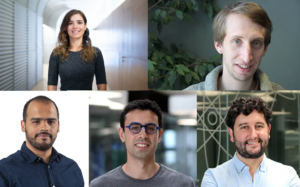Five researchers from three BIST centres have been awarded European Research Council (ERC) Starting Grants for 2022, worth up to €1.5 M for a five-year project. Congratulations to Dr. Katherine Villa from ICIQ, Dr. José Hugo García from ICN2, and Prof. Pelayo García de Arquer, Dr. Matz Liebel, and Dr. Ernest Pastor from ICFO.

ERC 2022 Starting Grant recipients from the BIST centres. Top: Dr. Katherine Villa (ICIQ) & Dr. Matz Liebel (ICFO). Bottom: Dr. José Hugo García (ICN2), Dr. Ernest Pastor (ICFO) & Prof. Pelayo García de Arquer (ICFO).
The European Research Council (ERC) offers funding schemes directed at researchers at different stages of their careers. Starting Grants help excellent young scientists, who have 2 to 7 years of experience after their PhDs to launch their own projects, form their own teams, and pursue their most promising ideas. A total of 408 early-career researchers have been awarded in this call, worth €636 million in total, as part of Horizon Europe, the European Union’s Research and Innovation programme. Five researchers from three BIST centres have been awarded in this call.
Dr. Katherine Villa from ICIQ has been awarded for the project ‘Engineering of Photo-rechargeable Nanoswimmers using Multicomponent Heterojunctions’ (Photoswim). Photoswim aims to develop autonomous nanoswimmers that carry their own energy source to keep moving and functioning in the dark. To do so, they will be provided with an optical battery that acts as an inner energy source for in-situ photoactivation, unlocking their full applicability.
“Inspired by nature, we can design tiny devices that consume energy from their surroundings and transform it into motion, mimicking biological microswimmers. However, current nanoswimmers require constant energy input to keep their functionalities, limiting their applicability to specific conditions.” says Villa.
The acquired knowledge from this investigation will allow Dr. Villa to programme their motion activation in the dark by modulating the energy/charge transfer among components. Such unique features will make a big leap in the field by minimising human control. Moreover, it will enable their use in biomedicine, such as for bioimaging and photodynamic therapy. Likewise, it will provide a unique approach for assessing energy/charge transfer mechanisms based on the motion behaviors that are of course important for the fields of material science, and photophysics.
Dr. José Hugo García, Senior Postdoctoral researcher in the ICN2 Theoretical and Computational Nanoscience Group, will develop artificial intelligence-driven materials for spintronic applications.
In his project, called AI4PSIN (‘Artificial Intelligence–Driven Materials Design for Spintronic Applications’), he will combine artificial intelligence and biology-inspired optimisation strategies to discover new combinations of two-dimensional materials, with the aim of improving next-generation ultralow power non-volatile memories. These newly designed memories will provide both the superior speed of random-access memories (RAM) and the large storage of solid state drives (SSD) at a fraction of the energy cost.
Prof. Pelayo García de Arquer, Leader of the CO2 Mitigation Accelerated by Photons group at ICFO, has been awarded funding to pursue the project ‘Nanoscale Advance of CO2 Electroreduction’ (NASCENT). NASCENT seeks to advance the understanding of electrochemical interfaces using a novel combination of operando spectroscopies; and, using this information, programme them using atomically designed materials to bring CO2 electroreduction closer to viability.
“To a large extent, we are still building catalyst in the dark. We aim to shed light on this process, providing the first full picture of the CO2 electrochemical interface at industrially relevant current densities. This is crucial to enable a rational catalyst design, with the ultimate goal of improving the performance of this decarbonizing technolog,” says García de Arquer.
Dr. Matz Liebel is currently a research fellow in the Molecular Nanophotonics group at ICFO but will soon move his research pursuits to VU Amsterdam (NL). Dr. Liebel has been awarded funding to pursue the project ‘Phototransient InfraRed Holograph’ (PIRO). At this critical juncture in his career, Liebel comments, “I came to ICFO with an ultrafast nonlinear spectroscopy background and most of my work here revolved around pushing holographic imaging methodologies. I always thought that combining these holographic concepts with ultrafast spectroscopy tools, a rather unusual combination, would allow me to build innovative biomedical imaging platforms that could really impact diagnostics. The ERC grant allows me to see if this prediction is true”.
Dr. Ernest Pastor, until recently a postdoctoral researcher in the Ultrafast Optical Dynamics group at ICFO and currently conducting research at the Institute of Advanced Materials (Castelló, Spain). Dr. Pastor has been awarded funding to pursue the project ‘PhotoDefect‘, tailoring lattice oxygen and photo-induced polarons to control reaction mechanisms and boost catalytic activity. When asked what this funding means for his research, he commented, “This will allow us to develop new tools to learn how to master photoactive solids. In particular we want to understand how to take advantage of imperfection is solids to boost their catalytic properties. Sometimes these imperfections are unavoidable and negative for performance and we want to learn if we can turn this around and make those defects work for us.”
Learn more:
ICN2 newspiece
ICIQ newspiece
ICFO newspiece
ERC Starting Grants 2022 full list of winners
